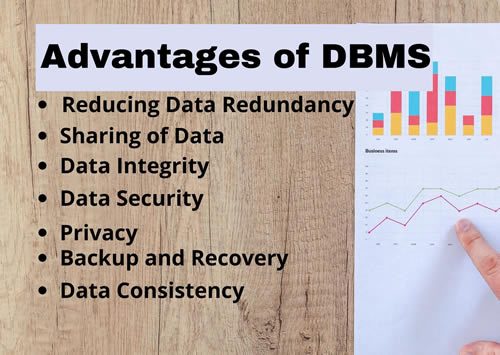Table of Contents
Advantages of the Database management system
Main Advantages of the Database management system: – A database management system (DBMS) is defined as a software system, which allows the user to access, create, maintain, and control the database.
The DBMS makes it possible for the user to create, read, update, and delete data in the database. It is a layer between the program and the data.
Compared to file-based data management systems, database management systems have several advantages.
Some of the Advantages of the Database management system are given below –

Reducing Data Redundancy
The File Based Data Management System contained many files that were stored in one system or in many different locations in multiple systems.
Because of this, sometimes there were multiple copies of the same file which leads to Data Redundancy.
This is prevented in the database as there is only one database and any changes in it are immediately reflected. Because of this, there is no chance of encountering duplicate data.
Sharing of Data
In a database, users of the database can share data among themselves. There are different levels of authorization to access the data, and consequently, the data can only be shared based on the correct authorization protocol.
Many remote users can use the database simultaneously and share data among themselves.
Data Integrity
Data integrity means that data is accurate and logical in the database. Data integrity is very important because a DBMS contains many databases.
All of these databases contain data visible to many users. It is therefore necessary to ensure that the data is correct and consistent in all databases and for all users.
Data Security
Data security is an important concept in the database. Only authorized user should be allowed to access the database and their identity should be authenticated using the user name and password.
Unauthorized user is not allowed to access the database under any circumstances
Privacy
Privacy rules in a database mean only authorized users can access the database according to their lack of privacy.
There are levels of database access and a user can only view the data he or she is allowed to.
Example – In social networking sites, usage constraints are different for different accounts that a user wants to access.
Backup and Recovery
Database Management System takes care of backup and recovery automatically. User does not require data backup periodically as this is taken care of by the DBMS.
In addition, it also restores the database after a crash or failure in the previous state of the system.
Data Consistency
Continuity of data in the database is ensured as there is no data redundancy. All data appears continuously in the database and the data is the same for all users viewing the database.
In addition, any changes to the database are immediately reflected to all users and there is no data inconsistency.
For more interesting Articles Click Here
For more interesting Articles Click Here
if you have any questions regarding database management system then comment your questions
Thank you
